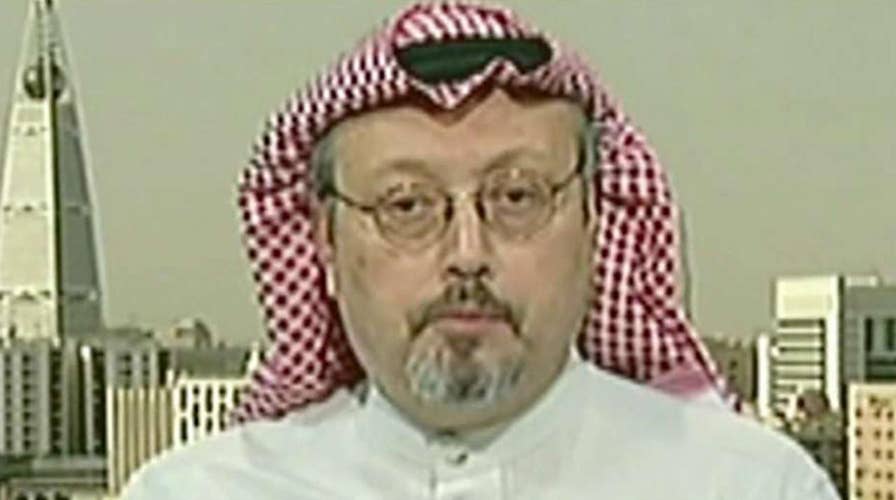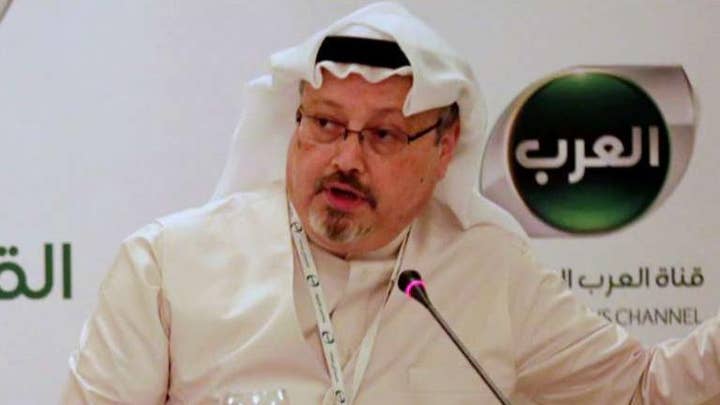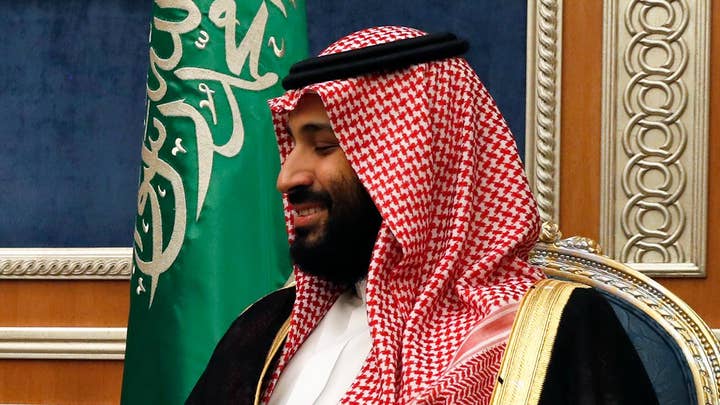Jamal Khashoggi is dead. Now it’s official.
Saudi Arabia claims that Khashoggi, a Saudi journalist and Washington Post columnist who had been living in the U.S., was accidentally strangled Oct. 2 in a fight with 15 Saudis employed by the nation’s security services and military inside the Saudi Consulate in Istanbul.
The Saudi government said it has arrested the entire team and three others. It blames two of the Saudi crown prince’s key aides – the deputy director of Saudi intelligence and his top communications adviser – for Khashoggi’s death. And the kingdom appointed that same crown prince to head a committee to review the incident and restructure the nation’s intelligence agency.
President Trump called the arrests “a great first step” and said he wanted to talk more to the Saudis about what happened. The White House issued a statement offering the Khashoggi family condolences over the “tragic” incident.
But the Saudi announcement, made in the dead of night over a weekend, is a pathetic attempt not only to salvage the vital strategic U.S.-Saudi relationship but to exonerate the man responsible directly or tacitly for Khashoggi’s brutal murder. That man is Crown Prince Mohammed bin Salman.
Bin Salman is known by his initials as MBS – or “Mr. Bone Saw,” as critics now call him on Twitter, a reference to the Turkish government’s claim that Khashoggi was drugged and dismembered at the consulate.
Saudi Arabia may well succeed in its effort to shore up relations with Washington and save the impetuous young crown prince from his own rash actions. The U.S. has a longstanding strategic interest in close ties to the kingdom – securing access to oil, selling it massive amounts of weapons, containing Iran, and defeating the extremist Islamic forces that the kingdom itself promoted for decades.
But the Saudi government’s explanation of how Khashoggi was killed – offered 18 days after insisting that he had left the consulate alive – is dismal. For strategic reasons, it may pass muster with the White House. But it shouldn’t. And if initial reaction is any indication, Congress may not buy in.
Hearing the news Friday night, Sen. Lindsey Graham, R-S.C., tweeted: “To say that I am skeptical of the new Saudi narrative about Mr. Khashoggi is an understatement.”
Rep. Adam Schiff, a California Democrat and senior House Intelligence Committee member who got a briefing on Khashoggi’s disappearance, called the new Saudi version “not credible.”
Repairing the damage done to the credibility of MBS and the kingdom requires more candor and accountability.
Trying to protect Crown Prince Mohammed by blaming Khashoggi’s murder on Maj. Gen. Ahmed al-Assiri (MBS’s senior military adviser) and Saud al-Qahtani (the crown prince’s top communications adviser) for what Turkish officials have described as Khashoggi’s gruesome torture and dismemberment is an all-too-convenient cover story.
Secretary of State Mike Pompeo was said to have bluntly warned the Saudis that MBS’s future depends on how well or how badly the episode is handled. MBS must “own” the situation, he purportedly told him.
But the brash 33-year-old crown prince has chosen a different course. One of the few royals to be educated solely in the kingdom rather than in the West, MBS can add this to his growing list of unforced errors, especially in foreign policy.
As a newly minted 29-year-old defense minister in 2015, MBS promoted Riyadh's intervention in the Yemeni civil war against the Iranian-backed Zaydi Shiite Houthis. The intervention has been a humanitarian and public relations disaster for the kingdom.
Over 15,000 Yemenis have died, including, according to recent United Nations reports, over 1,400 children. That Saudi intervention has also exposed the incompetence of the kingdom’s military.
MBS has also led the effort to boycott Qatar for its ties to Iran, Riyadh’s strategic competitor, and for its support for the Muslim Brotherhood. The Brotherhood is a rival militant Islamist movement despised by Saudi Wahhabis, who promote their own brand of extremist Islam.
MBS was responsible, too, for the bone-headed temporary detention (and beating, Arab sources say) of Lebanese Prime Minister Sa'ad al-Hariri, whom MBS saw as too close to Iran and its Lebanese proxy, Hezbollah, which is now Lebanon's leading political force.
MBS has touted his commitment to reform and determination to drag the kingdom into the 21st century by, among other things, letting women drive. But he arrested several of the Saudi women who had led the campaign for which he claimed credit.
The number of jailed dissidents has grown, along with the praise in the domestic and foreign press about MBS’s Vision 2030, a campaign to shift the base of the Saudi economy away from oil. But that vital effort to employ young, frustrated Saudis in real, non-government jobs requires massive foreign investment.
Yet the decision last year by MBS to imprison without formal charges some 400 Saudi officials and businessmen in a five-star Ritz-Carlton Hotel to extort what he claimed were their ill-gotten gains – though wildly popular with young Saudis – has frightened the very foreign investors upon whom the kingdom’s economic transformation depends.
Then came the gruesome killing of Khashoggi, a critic who endorsed the thrust of MBS’s reforms, but not the man implementing them.
There must be panic within the ruling family, which is among the world's least transparent cliques. While few analysts think that King Salman will oust his son, MBS could have helped his case by trying to become the reformer he pretends to be.
The crown prince could do more to end the war in Yemen. He could stop lecturing Saudis about working harder and tightening their belts while he buys $300 million villas in France and $450 million yachts with their money.
MBS could release the Saudi women drivers he has imprisoned. He could prove to potential investors that contracts will be awarded transparently and without bribes to his family. He could commit to the rule of law rather than actions driven by princely pique.
And to be really bold, MBS could free his cousin, Mohammed bin Nayef, from palace arrest. Bin Nayef worked closely with the Pentagon on counterterrorism before King Salman changed the line of succession in favor of his son. And finally, MBS could vow that such a barbaric act as Khashoggi’s murder would never happen again.
MBS could have doubled down on the reform he has touted and become the ruler so many of his young fans at home and abroad – among them President Trump’s son-in-law and senior adviser Jared Kushner – want him to be.
MBS has not done that. Now we know who he is. What remains to be seen is who we Americans are.



